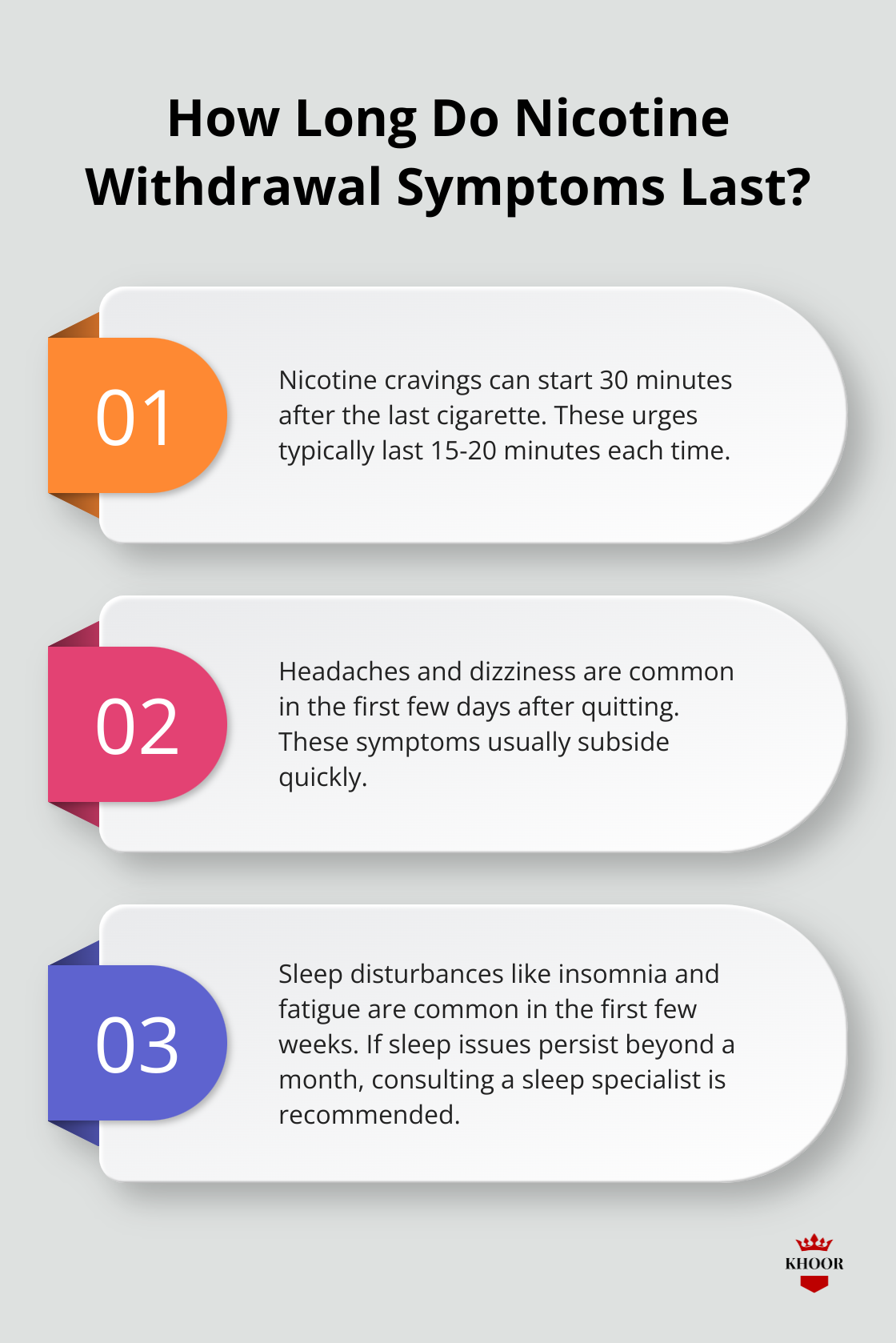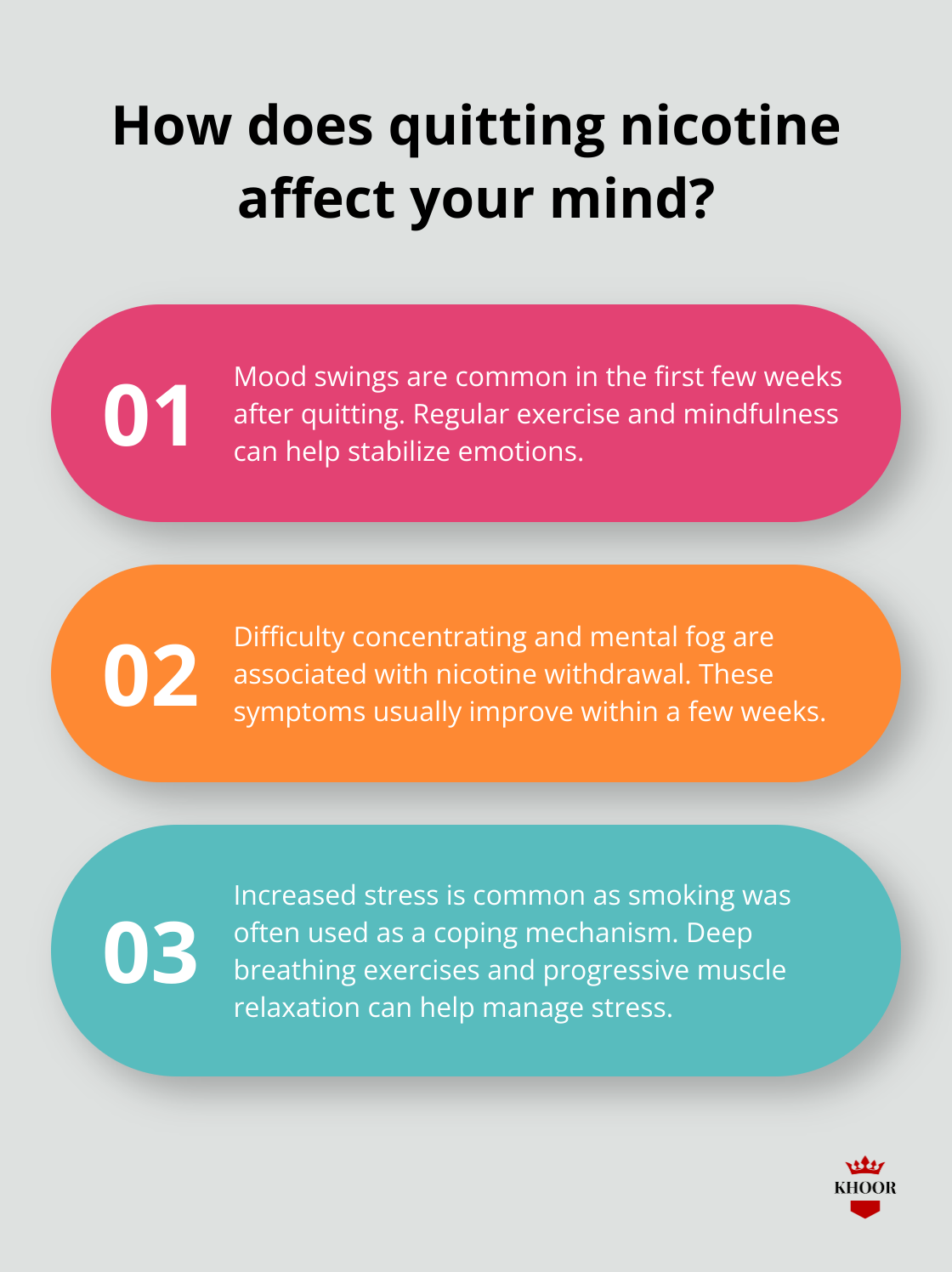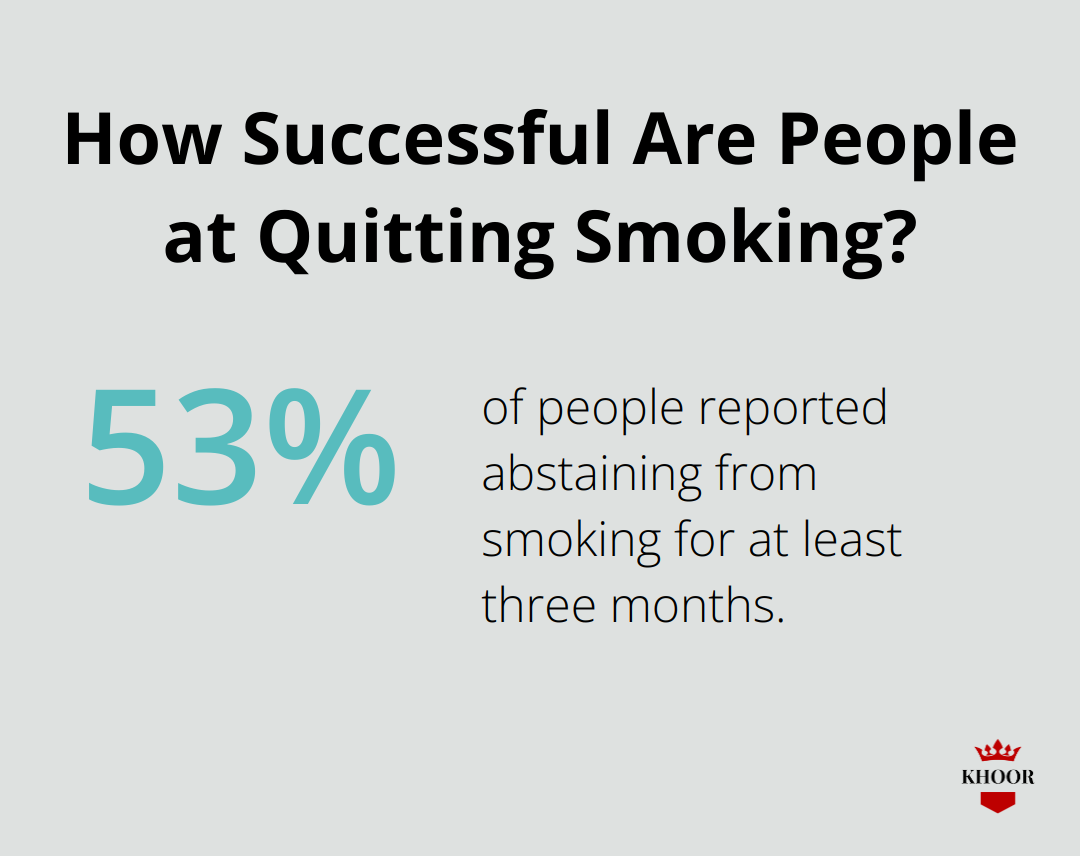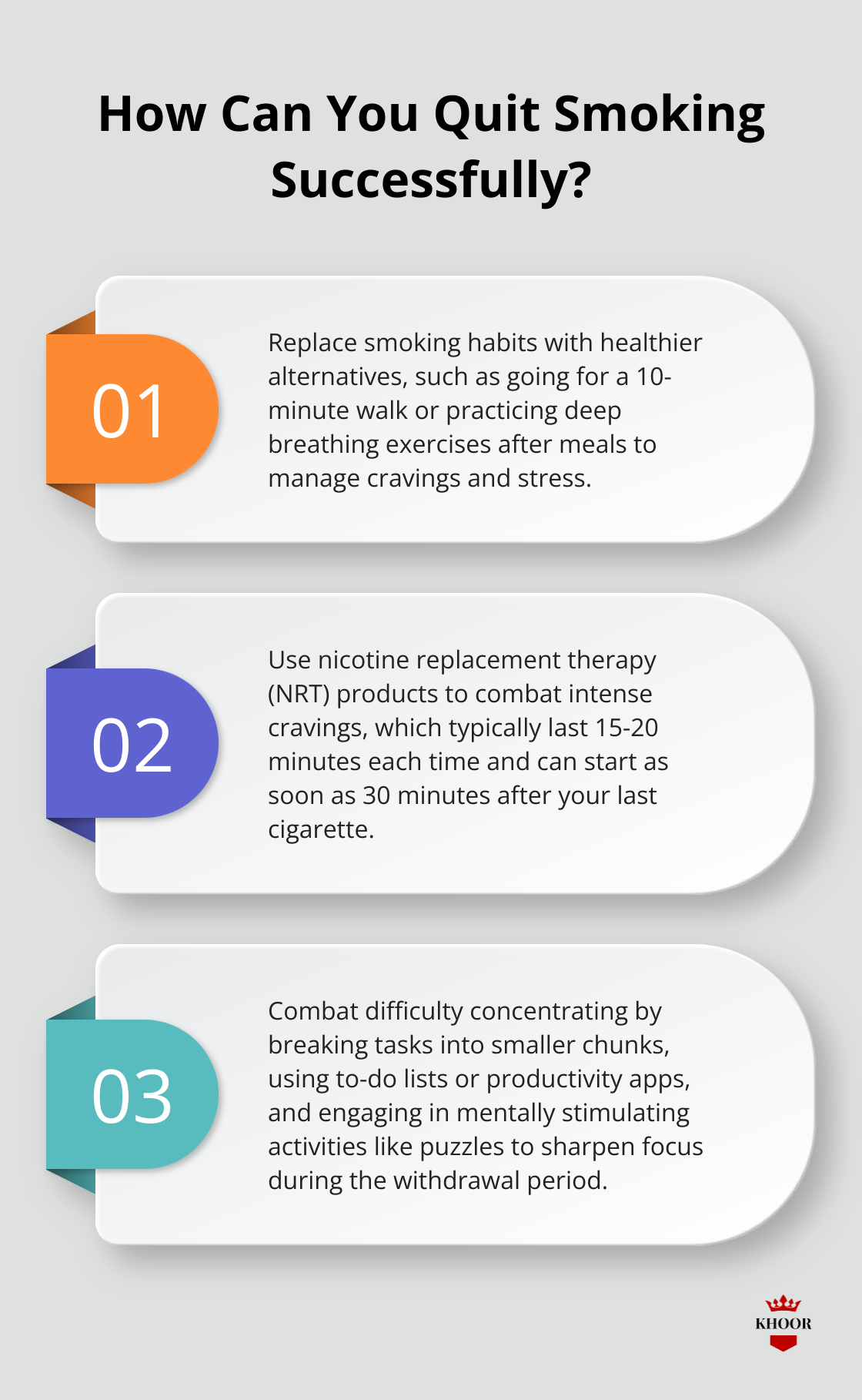
Herbal Smoking Wellness: All You Need to Know
Explore the benefits and tips of herbal smoking wellness with information on health impacts, botanical choices, and DIY blends.

Quitting nicotine is a challenging journey, often accompanied by a range of withdrawal symptoms. These effects can be both physical and psychological, impacting daily life in various ways.
At KHOOR, we understand the difficulties smokers face when trying to quit. This guide will explore the common withdrawal symptoms experienced during the nicotine cessation process, helping you prepare for what lies ahead.
Quitting nicotine triggers a range of physical reactions in your body. Understanding these symptoms can help you prepare and manage them effectively.
Nicotine cravings are often the most challenging symptom to overcome. These urges can start as soon as 30 minutes after your last cigarette and typically last 15-20 minutes each time. To combat cravings, try nicotine replacement products or engage in distracting activities like going for a walk or calling a friend.
Many quitters experience headaches and dizziness, especially in the first few days. These symptoms usually subside quickly. Stay hydrated and get plenty of rest to alleviate these effects. If headaches persist, consult your healthcare provider.
You might notice an increased appetite after quitting. This is because nicotine suppresses hunger, and its absence can lead to more frequent eating. Using nicotine replacement therapy (NRT) probably reduces weight gain slightly after 12 months, compared with not using NRT. To manage this, focus on healthy, low-calorie snacks and increase your physical activity.
Insomnia and fatigue are common in the first few weeks after quitting. Nicotine affects sleep patterns, and your body needs time to adjust. Establish a consistent sleep schedule and avoid caffeine in the evening. If sleep issues persist beyond a month, consider talking to a sleep specialist.

Remember, these symptoms are temporary and a sign that your body is healing. With the right strategies and support, you can successfully navigate this challenging phase of your quit journey.
Quitting nicotine doesn’t just impact your body; it also significantly affects your mental and emotional state. These psychological effects can be intense and challenging to manage, but understanding them is crucial for a successful quit journey.
In the first few weeks after quitting, you might feel like you’re on an emotional rollercoaster. Mood swings are common, and you may find yourself feeling jumpy or restless. These feelings are normal and temporary. They typically occur during the first days or weeks after quitting.

To manage these emotional fluctuations, try incorporating regular exercise into your routine. Physical activity releases endorphins, which can help stabilize your mood. Even a 10-minute walk can make a difference. Additionally, practicing mindfulness or meditation can help you stay grounded during emotional upheavals.
Many quitters report difficulty concentrating or feeling mentally foggy. This is because nicotine withdrawal is associated with deficits in neurocognitive function, including sustained attention, working memory, and response inhibition. This symptom usually improves within a few weeks.
To combat this, break tasks into smaller, manageable chunks. Use tools like to-do lists or productivity apps to stay organized. Engaging in mentally stimulating activities like puzzles or learning a new skill can also help sharpen your focus.
You might find that situations you previously handled with ease now feel overwhelming. This is because smoking was often used as a stress-coping mechanism. Learning new stress management techniques is crucial for long-term success.
Deep breathing exercises can be particularly effective. Try the 4-7-8 technique: inhale for 4 seconds, hold for 7, and exhale for 8. This can help reduce anxiety and stress almost immediately. Progressive muscle relaxation is another useful technique that can be practiced anywhere.
Remember, these psychological effects are temporary. They’re signs that your brain is healing and adapting to life without nicotine. With patience and the right coping strategies, you can successfully navigate this challenging phase of your quit journey.
The journey to quit nicotine is different for everyone, but understanding the typical timeline of withdrawal symptoms can help you prepare and stay motivated. Let’s break down what you might experience in the weeks and months after quitting.
The initial days are often the most challenging. Within 24 hours of your last cigarette, you’ll likely experience intense cravings and irritability. Nicotine, the addictive substance present in tobacco products, can affect a person’s brain function. These symptoms typically peak around day three.

A study published in the journal Addictive Behaviors found that withdrawal symptoms were most severe on the first day of abstinence and gradually decreased over the following weeks. During this time, focus on staying hydrated and getting enough rest. Many find that short bursts of physical activity, like a brisk 10-minute walk, can help manage cravings and mood swings.
As you enter the second week, you might notice a shift. While cravings may still occur, they’re often less frequent and intense. However, this is when psychological challenges often come to the forefront.
Research from the University of Minnesota shows that symptoms like anxiety and depression can persist for 2-4 weeks after quitting. This is a critical time to lean on your support system. Consider joining a support group or using a quit smoking app to stay accountable and motivated.
By the one-month mark, most physical withdrawal symptoms have subsided significantly. However, the psychological aspect of quitting remains a challenge. This is the time when many people face the risk of relapse, especially in stressful situations.
A study reported the rate of abstinence for at least three months as 53%. To join this group, focus on replacing smoking habits with healthier alternatives. For instance, if you used to smoke after meals, try going for a short walk or practicing deep breathing exercises instead.
Remember, while this timeline provides a general guide, your experience may vary. Some people find relief from symptoms sooner, while others may struggle for longer. The key is to stay committed to your goal and seek support when needed. With each passing day, you’re one step closer to a healthier, nicotine-free life.
Quitting nicotine is a challenging journey, but understanding the withdrawal process is a crucial step towards success. As we’ve explored, the physical and psychological symptoms can be intense, ranging from cravings and headaches to mood swings and difficulty concentrating. However, it’s important to remember that these symptoms are temporary and typically peak within the first week before gradually subsiding.

The road to a nicotine-free life isn’t always smooth, but the benefits far outweigh the temporary discomfort. By preparing yourself for the withdrawal process, you’re already taking a significant step towards better health. Remember, every craving you overcome is a victory, and each day without nicotine is a step towards a healthier you.
For those considering quitting, know that you’re not alone in this journey. Millions have successfully quit before you, and with determination and the right support, you can join their ranks. Don’t be discouraged by setbacks – they’re a normal part of the process. Instead, view them as learning opportunities that strengthen your resolve.
If you’re looking for ways to ease the transition, we at KHOOR offer a health-conscious alternative to traditional cigarettes. Our all-natural herbal cigarettes provide a satisfying smoking experience without nicotine or tobacco, helping you maintain familiar rituals while avoiding harmful substances. Whether you’re quitting cold turkey or gradually reducing your nicotine intake, KHOOR can be a valuable tool in your quitting arsenal.
Remember, quitting nicotine is one of the best decisions you can make for your health. The journey may be challenging, but the destination – a healthier, nicotine-free life – is worth every effort. Stay strong, stay committed, and embrace the positive changes that come with breaking free from nicotine dependence.

Explore the benefits and tips of herbal smoking wellness with information on health impacts, botanical choices, and DIY blends.

Explore how KHOOR supports nicotine replacement with herbal cigarettes, success rates, and user stories for a healthier, smoke-free life.

Explore the benefits of quitting tobacco & nicotine with healthy alternatives. Improve your health and well-being with tips and data-backed advice.

Achieve your quit smoking goals with KHOOR’s supportive approach. Discover benefits, statistics, and practical tips for a healthier life.

Explore practical tips to smoke without nicotine, including product recommendations and real-life statistics to support your healthier lifestyle choices.

Explore tobacco-free alternatives with KHOOR. Learn about options like herbal cigarettes, nicotine pouches, and vaping for a healthier lifestyle.